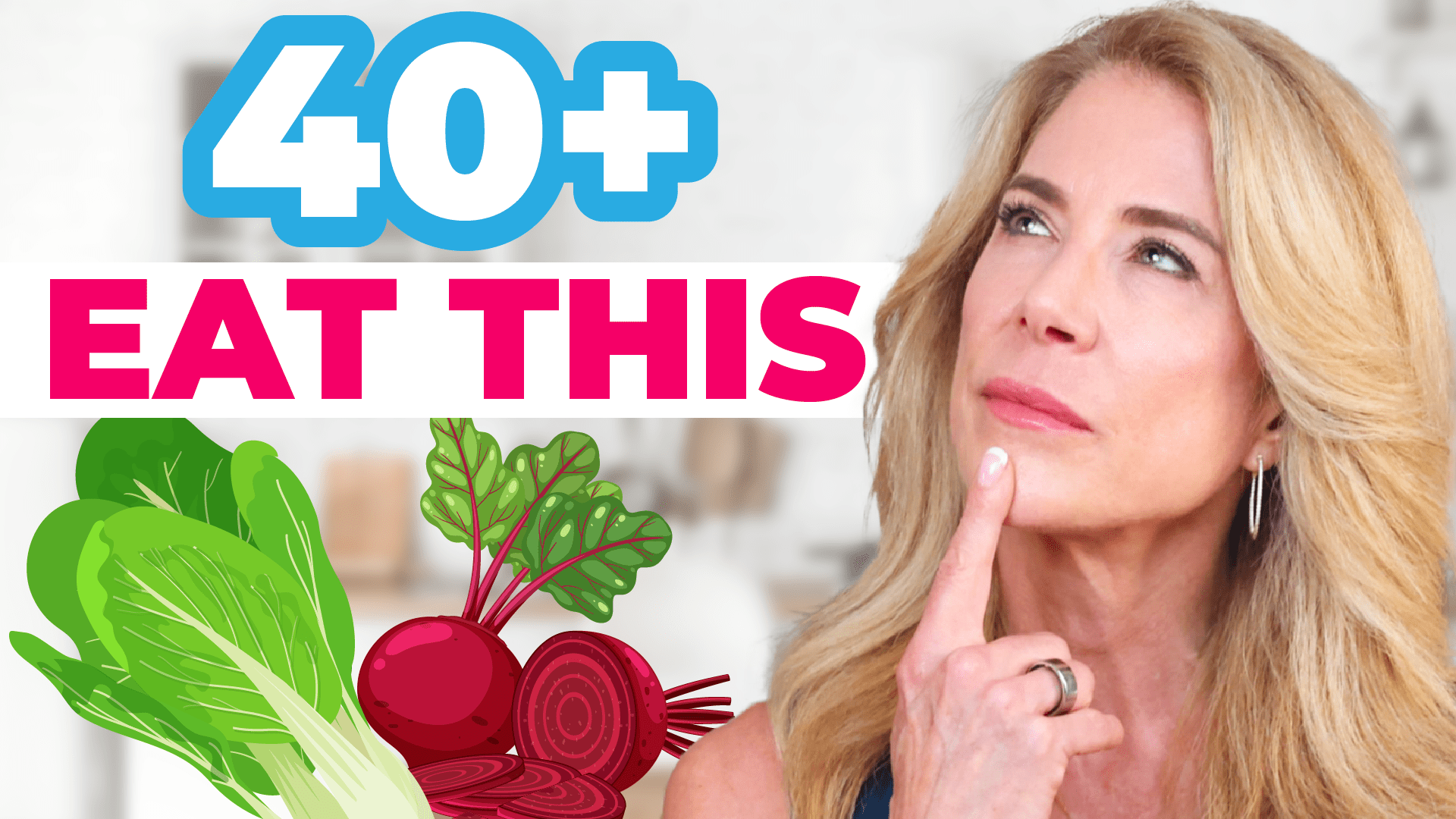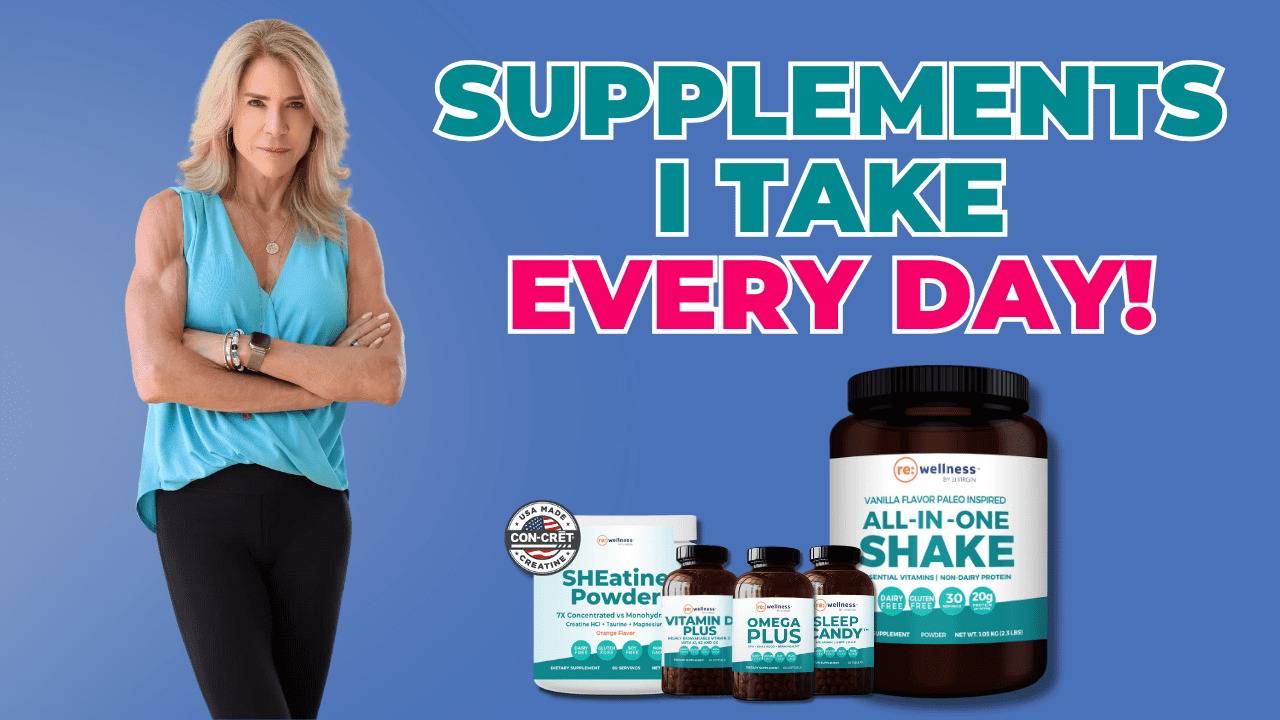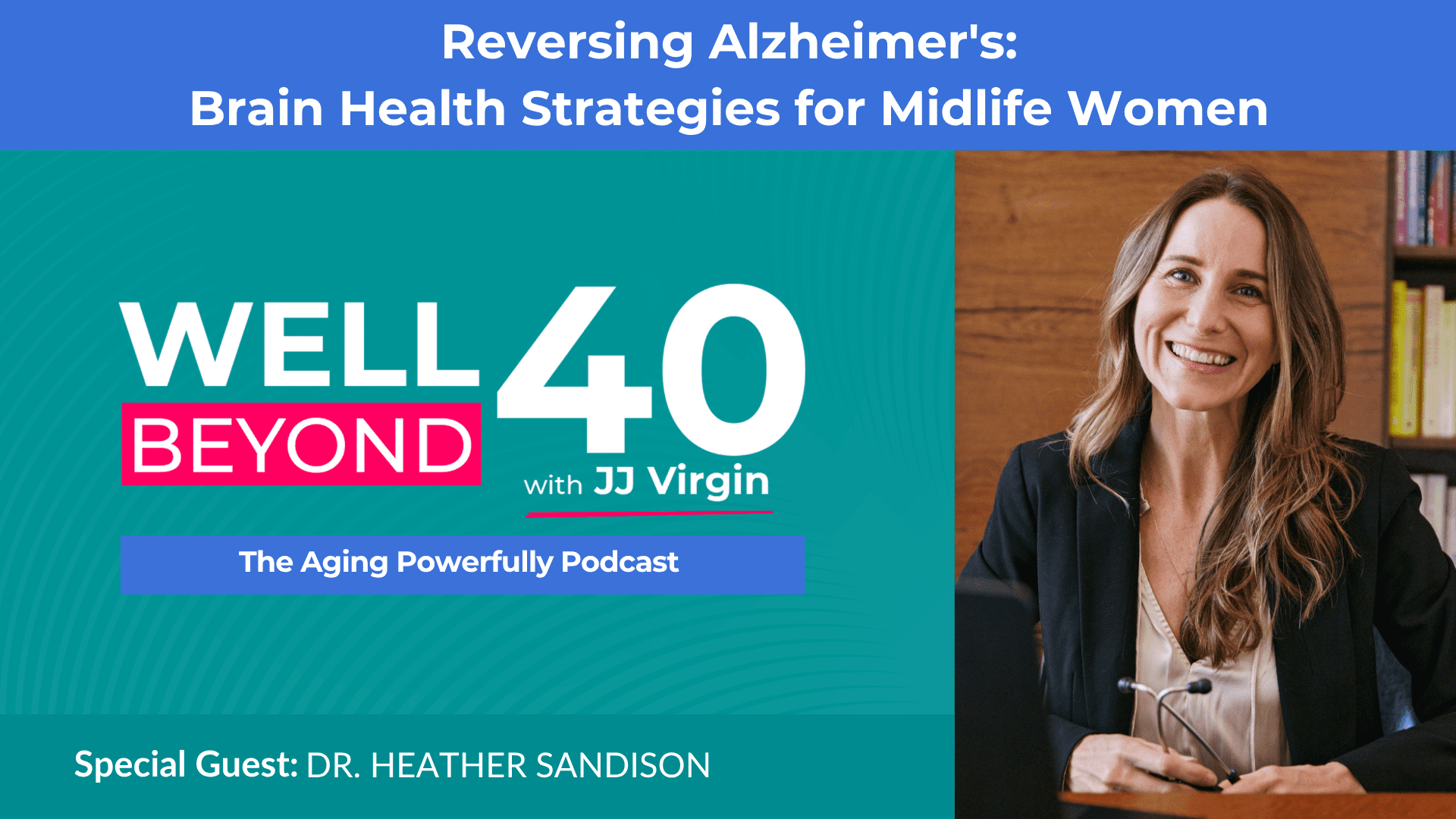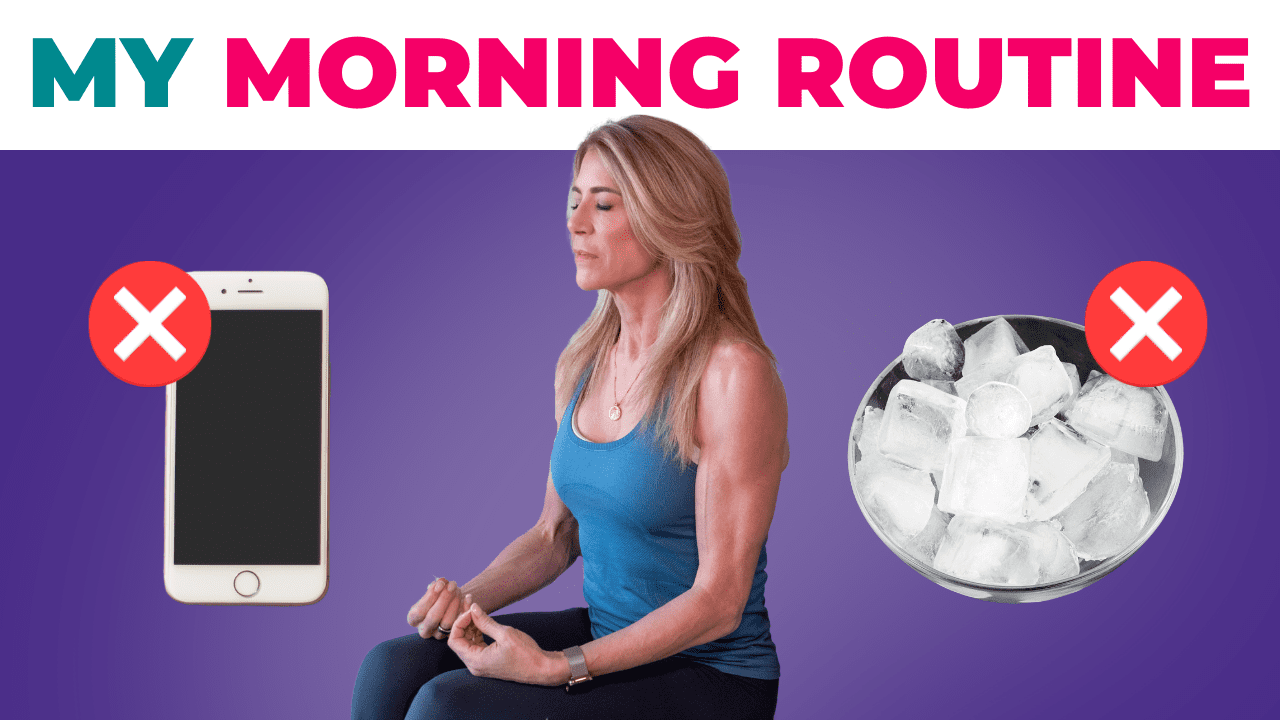How to Support Your Changing Metabolism, Gut Health, and Hormones
Once you hit 40, the rules change. You can’t eat the way you used to and expect the same results. If you want to stay fit and healthy—and who doesn’t?—you’ve got to take a new approach.
In this episode, I’m sharing my top healthy eating strategies to help you boost your metabolism, improve your gut health, balance your hormones, and start aging powerfully. You just might end up feeling better than you did at 20!
Let’s dive in!
Timestamps
00:01:25 – Phytoestrogen-rich foods that support your health as you age
00:02:53 – The best nutrient for muscle health, metabolism, burning fat, and better satiety
00:05:50 – Find out how much protein you need with my free and easy challenge
00:06:16 – All carbs are not created equal, here’s how to choose the right ones for adrenal health, better sleep, and more
00:08:28 – Promote better gut health and blood-sugar control with this type of food
00:10:42 – How you can customize bone broth for healthier and firmer skin
00:12:33 – Reduce the risk of age-related problems when you eat food rich in this nutrient
Resources Mentioned in this episode
Watch the FULL VIDEO on my YouTube Channel
Read my book, Sugar Impact Diet
Download your Free Resistance Training Cheat Sheet
Listen to Cook to Heal Your Hormones with Dr. Alan Christianson
Get to know Dr. Alan Christianson
Listen to Bone Broth Benefits to Get Slimmer and Younger with Dr. Kellyann Petrucci
Get to know Dr. Kellyann Petrucci
Try my Eat Protein First 7-Day Challenge
Inner Wellness, Outer Beauty: Your Anti-Aging Cheat Sheet
Reignite Wellness™ All-In-One Shakes
Reignite Wellness™ Extra Fiber
Reignite Wellness™ Collagen Peptides Powder
Reignite Wellness™ Amino Power Powder
Watch 6 Things I Stopped Doing Once I Turned 50 for Better Longevity
Video: What to Eat, When to Eat, and Why for Mood
How Much Collagen Do You Need?
ATHE_Transcript_Ep 640_The ULTIMATE Guide to Healthy Eating for Women Over 40
[00:00:00] JJVirgin: I’m JJ Virgin, PhD dropout, sorry mom, turned four-time New York Times bestselling author. Yes, I’m a certified nutrition specialist, fitness hall of famer, and I speak at health conferences and trainings around the globe, but I’m driven by my insights. You know, I’m a person of insatiable curiosity and love of science to keep asking questions, digging for answers, and sharing the information that I uncover with as many people as I can.
[00:00:26] And that’s why I created the Well Beyond 40 podcast to synthesize and simplify the science of health into actionable strategies to help you thrive. In each episode, we’ll talk about what’s working in the world of wellness, from personalized nutrition and healing your metabolism to healthy aging and prescriptive fitness.
[00:00:45] Join me on the journey to better health so you can love how you look and feel right now and have the energy to play full-out at 100.
[00:00:59] Newsflash! Your body seems to change the rules right around 40, so you just can’t eat the way you used to and expect to get the same results. Today, I’m going to spill the secrets of how you can outsmart the hands of times and reclaim that energy and body you had in your 20s and 30s by eating for what your body needs now in 40 and beyond.
[00:01:23] So you probably heard of soy because of the phytoestrogens, but turns out there’s some better isoflavone-rich foods. And when I’m thinking of those specifically, I’m going to call out tahini, which is made with, of course, chickpeas and sesame seeds are great sources. So hummus is another one, flax seeds and garlic.
[00:01:44] These are phytoestrogens that can help balance the hormonal fluctuations that start to happen. They can even start in your 30s, but for sure now they’re going on in 40 plus. It can also potentially alleviate symptoms associated with menopause, like hot flashes and mood swings. And these isoflavones may have a protective effect on bone density, which is, of course, really important for preventing osteoporosis and fractures.
[00:02:10] Plus, consumption of isoflavone-rich foods can help support heart health, and they may help lower LDL cholesterol levels and reduce the risk of cardiovascular disease. Plus, isoflavones have antioxidant properties that can contribute to healthier skin by protecting it from oxidative damage. And some research suggests that isoflavones may be able to impact cognitive function and memory and also have a protective effect on breast health, which of course is particularly relevant for women in their 40s who are concerned about breast health and cancer risk.
[00:02:46] Plus, these are great healthy foods overall to be incorporating into your diet. Next up, another one I want to make sure you’re incorporating into your diet every single day is clean, lean, quality protein, and that is because as we age, we have this phenomenon that happens called anabolic resistance, which means as we age, it is harder for us to go through muscle protein synthesis.
[00:03:13] We are going to need more protein, not less, as we age. Now, protein supports muscle maintenance, it supports strength and functionality—all these things that we have to stay active and to have an independent life. Plus, protein is the most thermic food macronutrient there is. So, protein-rich foods take about 25 percent of the calories when you eat them just to be, just to digest and metabolize them.
[00:03:41] Contrast that with carbohydrates, which is like 5–10 percent, and fat, which is negligible. So here’s a great metabolic boost: if all you did was take the same amount of calories and move some of the calories away from carbs or fat and put them into protein, that can help you start to lose body fat and also improve not just your metabolism but also your satiety and your satisfaction.
[00:04:09] Next up, protein is really important for bone health. And protein can help regulate hormones related to muscle development, fat metabolism, and overall vitality. Plus, of course, we know that protein is the most satiating macronutrient. And what’s going to really blow it for you on your diet? Being hungry, right?
[00:04:30] It also goes beyond satiety because there’s satiety, and we know that we’ve got a couple different hormones being regulated by protein. One of them is ghrelin, one of them CCK. These things that will tell your body when you feel full and you don’t need to eat anymore. But beyond that, it also impacts your satisfaction.
[00:04:50] What I’ve seen dramatically with people who are going through my seven-day eat protein first free challenge is the big things they tell me is they’re not hungry and they don’t have cravings. I think probably some of that is, and this is a hypothesis, is that protein helps us make our neurotransmitters, which then help us control our cravings.
[00:05:09] And of course, if you can control your hunger and your cravings, it is going to be way easier for you to manage your body composition and make better food choices. And by the way, the studies show that people who eat protein first—that is my mantra—actually make better protein choices. Plus, of course, protein supports the maintenance and repair of joint tissue, which can help with joint pain, joint stability, and overall reduction in the risk of injuries.
[00:05:37] We also know that protein intake is essential for brain health because it’s going to provide the necessary amino acids for neurotransmitter production, which can impact both your cognitive function and your memory. Now, in my seven-day eat protein burst challenge, I show you how easy it is to increase your protein intake to where you need it to be.
[00:05:57] And that’s why it comes with a calculator so you can figure out how much protein you need. Plus, I’m going to give you plenty of recipes to help you get started. And best of all, this is free. You can get this at [jjvirgin.com/7day](https://jjvirgin.com/7day), and that’s the number seven. Next up are carbs. Now, first off, I have to say that all carbs are not created equal because white bread’s a carb and broccoli is a carb.
[00:06:25] So obviously, these are not the same, but we want to start to think about carbs because of what they can do for your adrenal health, for your cortisol, and for your sleep. In fact, one of my buddies, Dr. Alan Christianson, says if you eat slow carbs at dinner, it will help lower cortisol. So you can get that sleep so that you can then repair from all the wear and tear of the day.
[00:06:45] He talks about this in his adrenal reset diet. So we want to eat carbs. But what I talk about in my sugar impact diet is again, all carbs are not created equal. Remember, all carbohydrates turn to sugar except for fiber. It’s just a matter of whether we’re making them slowly, making that sugar slowly from the food we’re eating, or for mainlining it.
[00:07:07] Let’s say like we’re eating Skittles, a muffin, or something like that. So we really want to look at eating carbs as close to nature as possible that have a lot of fiber. So that would be things like, say, a sweet potato that has vitamin C and magnesium that can help regulate cortisol levels. Now remember, I’m talking cortisol here because I find with a lot of us who are stressed or have any adrenal issues making sure that we get in our carbohydrates.
[00:07:33] First from non-starchy vegetables, then from a little bit, one, two servings of fruit, especially berries, and then a little bit of slow, low carbs, that we just do better, that it helps regulate our cortisol levels, because remember, if you’ve got elevated cortisol, which can happen due to stress, especially acute stress, it’s going to disrupt your sleep patterns, which then can mess up, lead to like chronic sleep disturbances, which can then lead to insulin resistance.
[00:08:00] When you have some healthy carbs in the diet, again, deep green leafies, loads of non-starchy vegetables, some berries, some purple sweet potatoes for the win, maybe some wild rice, some squashes, some lagoons. That is going to help you manage cortisol, promote a sense of calm and relaxation, and help with better sleep, especially getting a serving or two in your evening meal.
[00:08:24] Let’s dig into fiber. And really, when I think about fiber, I think of the prebiotics, probiotics, ferments, and everything else that can help the gut. So, fiber first. Fiber can act like a prebiotic, which is a non-digestible fiber that can promote the growth and activity of beneficial gut bacteria. I look at prebiotics as the fuel, as a way to feed your gut microbiome.
[00:08:51] This provides essential nourishment for these little microbes in your gut so that you get this nice, balanced, and diverse gut microbiome. Now let’s talk probiotics, because I just mentioned having this great, diverse gut microbiome. So one of the ways that you can help facilitate that is by getting probiotics.
[00:09:11] Probiotics, of course, help with healthy gut bacteria, diverse gut bacteria, and when you have a healthy gut, you’ve got better nutrient absorption. One of the places you can get probiotics is in fermented foods, and fermented foods can be things like kimchi real pickles, real sauerkraut, or yogurts. I find that to be the easiest way to do it.
[00:09:32] I wish I could say I love kimchi, but I’ve been playing around with different plant yogurts without added sugar and working on getting some in every single day. And again, that can really help with gut diversity, and you really want to. Big gut microbiome diversity. Now, one of the other cool things that fiber does, and we’re talking fiber.
[00:09:51] Remember, there’s a variety of different types of fiber, but specifically here, soluble and insoluble fiber can help support regular bowel movements and help you not have constipation, which is super important because remember, one of the ways we detoxify is through our stool. So, we want to make sure that we are having poops we can be proud of and moving things along.
[00:10:13] Fiber is really important for blood sugar control. Fiber is super important for your weight management because it helps reduce hunger. In fact, when you eat fiber and protein together, it slows down stomach emptying, keeps graylands, the breasts. So that’s fantastic. And it can also be good for cardiovascular health.
[00:10:31] In fact, high-fiber diets are associated with a reduced risk of heart disease. And when you have good fiber, it can help lower LDL cholesterol and raise HDL cholesterol. All right, now what about skin? Do a little shout out to my buddy, Dr. Kellyann Petrucci, who wrote the Bone Broth Diet and turned me on to all of the benefits of bone broth.
[00:10:51] Now I’m lazy, so when I discovered I could actually create a bone broth protein that would be rich in collagen and taste like chocolate or vanilla, that works well for me. I do keep collagen in my fridge, and I use it to cook with, especially if I’m making things like sauteed mushrooms or cauliflower rice.
[00:11:08] But I get my bone broth every day by using my bone broth protein. And it’s rich in collagen, which is super important for joint health but also for skin strength and elasticity. And what this collagen can do is help. Now, when you bring in collagen, whether you’re doing it from bone broth or bone broth shakes, your body breaks it apart, and then it’s going to use those building blocks to replenish collagen levels, which improves the firmness of your skin and helps reduce the visible signs of aging. And one of the other cool things with bone broth is it has anti-inflammatory compounds that can help reduce that help soothe skin conditions like acne or eczema. Of course, there’s a big gut-skin connection, and we also know bone broth helps heal and seal the gut, so there’s that benefit too.
[00:11:52] I mean, there’s so many benefits to bone broth. Beyond that, bone broth has antioxidants, has vitamin C, selenium, and zinc, which can help protect skin cells from oxidative damage caused by free radicals. Now, if you want more tips for skin health over 40, and of course, who doesn’t, I created my anti-aging cheat sheet.
[00:12:10] I put it at [jjvirgin.com/antiaging](https://discover.jjvirgin.com/anti-aging-cheat-sheet-yt-1). And in there I have skin care recommendations, the best foods for great skin, what supplements can work, and even mindfulness practices to help you turn back the clock from the inside out. Now let’s talk about polyphenol-rich foods because part of what we need to talk about in terms of healthy aging is methylation.
[00:12:33] Methylation influences DNA regulation, repair, and neurotransmitter balance. Its processes are like little switches that can affect how our genes and cells function. When turned on or off, these switches can change how our bodies operate and even influence whether specific genes are active or not.
[00:12:52] So for women over 40, ensuring these switches work correctly can help maintain good health and reduce the risk of age-related health problems. Supporting healthy methylation ensures these switches are in the correct positions to keep our bodies running well. Now, as women age, these processes can become less efficient, potentially leading to a range of age-related health issues.
[00:13:15] Good news though. Polyphenols, these are things found abundantly in things like beets and leafy greens like spinach and kale and collards play a crucial role in supporting the methylation processes in the body. Now, healthy methylation supports better brain Function it can support heart health by promoting healthy blood pressure.
[00:13:35] It reduces LDL cholesterol levels and improves blood vessel function. Methylation is also involved in detoxifying harmful substances from the body. Now, when you get good methylation support, which you can get by eating polyphenol-rich foods, you enhance the body’s ability to eliminate toxins and maintain overall health.
[00:13:56] These polyphenols are potent antioxidants that help combat oxidative stress and reduce the risk of DNA damage caused by free radicals. This antioxidant action is. particularly beneficial as women age and helps to maintain the cellular integrity and reduce the risk of chronic disease. Plus, bonus, they’re also anti-inflammatory.
[00:14:18] So I want you to think here in terms of polyphenols; this is where you want to think about eating by the rainbow. All of those deep green leafies, all of those different bright colors, all the different berries and the different bright yellows that you’re getting from the squashes—all of those things are going to give you a variety of different polyphenols that, as you can see, have a dramatic impact on your methylation.
[00:14:40] And as you can tell from all of this, diet is a major part of playing full-out in 50s, your 60s, and beyond. But it’s also about what you’re not doing, too. Now, I recently turned 60, I’ve got a lot of life lessons to share. Watch this next video on what I left behind in the last decade for better longevity and ability to play full-out seventies, eighties, and nineties, and beyond.
[00:15:07] Be sure to join me next time for more tools, tips, and techniques you can incorporate into everyday life to ensure you look and feel great, and more importantly, that you’re built to laugh. And check me out on Instagram, Facebook, YouTube, and my website, [jjvirgin.com](https://jjvirgin.com/). And make sure to follow my podcast so you don’t miss a single episode at [subscribetojj.com](http://subscribetojj.com/). See you next time!
Hide Transcript

 Subscribe to our show
Subscribe to our show 




